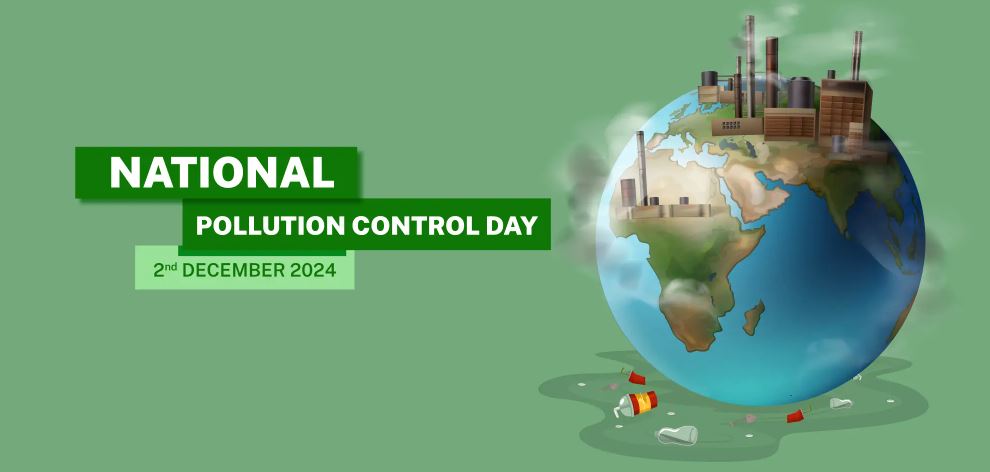
National Pollution Control Day is observed every year on December 2nd. This day raises awareness about pollution and its harmful effects. The theme for 2024 is “Clean Air, Green Earth: A Step Towards Sustainable Living.” This theme highlights the urgent need for eco-friendly practices. It reminds us of the ongoing battle against pollution in India.
The day commemorates the Bhopal Gas Tragedy, which occurred on December 2-3, 1984. This disaster claimed thousands of lives and affected many more. It exposed the dangers of industrial pollution and emphasized the need for strict regulations. Today, we remember those lost and strive to prevent such tragedies.
The Bhopal Gas Tragedy: A Wake-Up Call
The Bhopal Gas Tragedy was a catastrophic event. A gas leak at the Union Carbide pesticide plant released methyl isocyanate (MIC). This toxic gas killed over 3,500 people instantly. Long-term health issues affected more than 500,000 individuals. The tragedy highlighted the need for better industrial safety protocols and pollution control measures.
Since then, India has implemented several laws to combat pollution. These include the Air (Prevention and Control of Pollution) Act, 1981, and the Environment Protection Act, 1986. These laws aim to regulate emissions and protect our environment. However, challenges remain.
Current Air Pollution Scenario in India
India faces severe air pollution challenges. According to recent statistics, cities like Delhi and Ghaziabad rank among the most polluted globally. In 2024, Delhi recorded an Air Quality Index (AQI) exceeding 400 on several occasions, indicating hazardous air quality. This alarming situation is primarily due to vehicle emissions, industrial discharges, and stubble burning.
Here are some statistics on India’s most polluted cities:
| City | Rank | AQI | Level |
|---|---|---|---|
| Delhi | 1 | 404 | Hazardous |
| Ghaziabad | 2 | 346 | Severe |
| Gurgaon | 3 | 316 | Severe |
| Noida | 4 | 313 | Severe |
| Hisar | 5 | 312 | Severe |
In contrast, cities like Chandigarh and Pune have emerged as examples of cleaner environments. Chandigarh maintains an AQI below 100 due to effective waste management and green initiatives.
Statistics on Air Pollution Levels
- Delhi: AQI frequently exceeds 300.
- Mumbai: AQI levels often reach above 200.
- Chennai: Faces challenges with industrial pollution.
- Bhopal: Struggles with air quality despite historical lessons.
In comparison, cities like Chandigarh maintain an AQI below 100 due to strict regulations and community involvement.
Significance of National Pollution Control Day
National Pollution Control Day serves multiple purposes:
- Awareness: It raises awareness about pollution’s harmful effects.
- Commemoration: It honors the victims of the Bhopal Gas Tragedy.
- Action: It encourages collective efforts to combat pollution.
As Dr. Sunita Narain states, “We must leverage technology and community action to combat pollution effectively.” This day inspires individuals and policymakers to adopt sustainable practices.
Steps to Control Pollution
To combat pollution effectively, several steps can be taken:
- Promote Public Transport: Encouraging the use of buses and trains reduces traffic congestion.
- Adopt Clean Technologies: Industries should invest in cleaner production methods.
- Implement Strict Regulations: Enforcing laws on emissions can lead to significant improvements.
- Increase Green Spaces: Planting trees can improve air quality and provide shade.
- Raise Awareness: Educating citizens about pollution sources empowers them to take action.
- Ban on Firecrackers: A blanket ban on firecrackers that release harmful pollutants into the air.
Innovative Technologies for Pollution Control
Recent advancements in technology play a crucial role in pollution control:
- Air Purification Systems: These systems are being installed in urban areas to improve air quality.
- Waste Management Technologies: Innovations in recycling and waste segregation help reduce landfill use.
- Renewable Energy Sources: Solar and wind energy reduce reliance on fossil fuels.
These technologies are essential for sustainable development and improving air quality across India.
Other Forms of Pollution in India and Their Control
India faces other forms of pollution, each with unique challenges and solutions as with air pollution. Understanding these types is crucial for effective pollution control. Here’s a brief overview of the other major pollution types in India and how to address them.
1. Water Pollution
Water pollution is a significant issue in India. Major sources include untreated sewage and industrial waste discharged into rivers. Currently, only about 10% of wastewater generated is treated before being released into water bodies. This leads to contamination of drinking water sources, posing severe health risks.
Control Measures:
- Improve Wastewater Treatment: Invest in modern treatment facilities to ensure that wastewater is adequately treated before discharge.
- Regulate Industrial Discharges: Enforce strict regulations on industries to prevent the release of untreated waste into water bodies.
- Promote Sustainable Agriculture: Encourage practices that reduce agricultural runoff, such as organic farming and proper fertilizer management.
2. Solid Waste Pollution
Solid waste management is a growing crisis in India. Cities generate over 100 million tons of solid waste annually, leading to unsightly litter and health hazards. Poor governance and rising consumption contribute to this problem.
Control Measures:
- Implement Segregation at Source: Encourage households and businesses to separate waste into recyclables, compostables, and non-recyclables.
- Enhance Recycling Programs: Develop efficient recycling systems to minimize landfill use.
- Increase Public Awareness: Educate citizens about the importance of waste reduction and responsible disposal practices.
3. Noise Pollution
Noise pollution has become a significant concern in urban areas. Common sources include traffic, construction activities, and loudspeakers used during events. High decibel levels can lead to health issues like stress and hearing loss.
Control Measures:
- Enforce Noise Regulations: Implement strict noise level regulations in residential areas.
- Promote Quiet Zones: Designate areas where noise is limited, such as near schools and hospitals.
- Encourage Use of Sound Barriers: Install sound barriers along busy roads and construction sites to minimize noise impact.
4. Land or Soil Pollution
Soil pollution arises from the use of harmful pesticides, fertilizers, and improper waste disposal. In some regions, like Punjab, uranium contamination from industrial activities has led to severe health problems.
Control Measures:
- Promote Organic Farming: Encourage farmers to use organic fertilizers and pesticides to reduce soil contamination.
- Implement Proper Waste Disposal Practices: Ensure that hazardous waste is disposed of safely and does not contaminate soil.
- Conduct Regular Soil Testing: Monitor soil health regularly to identify contamination sources early.
Engaging Citizens in Pollution Control
Every individual can contribute to pollution control efforts:
- Use public transport or carpool whenever possible.
- Reduce plastic usage by opting for reusable bags.
- Participate in local clean-up drives or tree planting events.
Engaging citizens creates a sense of responsibility towards the environment. It fosters community spirit while promoting sustainable practices.
Conclusion: A Call to Action
National Pollution Control Day serves as a reminder of our collective responsibility. We must honor the victims of the Bhopal Gas Tragedy by actively working towards a cleaner environment. The theme “Clean Air, Green Earth” urges us all to adopt sustainable practices.
To achieve this goal, we need holistic changes in our approach to pollution control:
- Strengthen environmental laws and ensure compliance.
- Invest in clean technologies across industries.
- Foster community engagement through awareness campaigns.
Let’s pledge to combat all forms of pollution together! Join hands with your community this National Pollution Control Day. Every small action counts towards creating a healthier planet for future generations.
Are you ready to make a difference? Start today!

Industrialisation promotes pollution
Yes, that’s true! Just as Industrial revolution happened in the 19th century, we need a Green revolution to happen. There are positive signs in this regard, with transformation to renewable energy sources and usage of green technology. But it needs to be made mandatory across all industries with the phasing out of usage of fossil fuels.
Good blog
Thank you, Manish